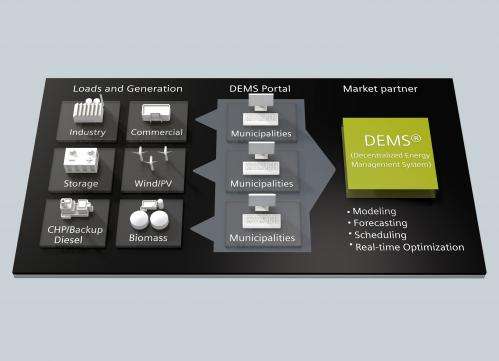Energy management in the cloud

Siemens is enabling smaller municipal utility companies to market energy from renewable sources through the cloud. The solution's main element is a cloud-based energy management system that combines distributed electricity producers into a virtual power plant. It allows small-scale producers to participate in the electricity market just like big power stations. As a result, distributed producers can trade electricity on energy exchanges or offer lucrative controlling power for increased earnings. In most cases, it doesn't pay off for small and medium-size municipal utilities and energy suppliers to invest in their own energy management systems. Siemens has solved this problem with a Web-based service that is derived from a compact version of its Decentralized Energy Management System (DEMS). The new system is currently being tested at RWE and will be offered beginning in the early summer of 2014.
Germany currently has about 800 municipal utility companies. Some of them, such as Stadtwerke München, already operate a virtual power plant. The technology's key element is an energy management system that networks electricity producers (i.e. wind farms, solar parks, biogas facilities) as well as energy storage devices and individual consumers. This network operates like a large, controllable power station. It can sell electricity on the energy exchange when the conditions are favorable, and also take part in the market for controlling power. To do this, the market participants provide power reserves, which the network operator can call up in order to keep supply and demand always in balance. This makes it possible to offset one of the generators dropping out or a sudden fall in demand. Virtual power plants also allow producers of energy from renewable sources to offer this service.
To enable smaller municipal utilities to access these markets, Siemens is offering all of the DEMS functions that make it possible to combine and control decentralized power stations as a cloud-based service. These functions include facility capacity forecasts, power plant control systems, and a Web portal where the operators of the decentralized energy generation units can notify the virtual power station whether their facilities are available. The various energy suppliers don't have to invest in the hardware, skilled personnel, and other elements of a separate energy management system. Siemens offers a high IT security standard and adapts the functions to any changes in the energy economy or regulatory framework that might occur. Municipal utilities also benefit from the fact that they no longer have to directly concern themselves with the complex processes on energy exchanges. The electricity is marketed through the virtual power plant, which is already part of the energy market.
Due to their ability to combine and control decentralized energy producers, virtual power stations are a key technology for future smart grids. They also help green electricity to be directly marketed, as recommended by the amendment to Germany's Renewable Energy Sources Act in 2012. The cloud-based service for virtual power stations helps to increase the amount of directly marketed energy by giving smaller electricity suppliers access to the energy exchanges.
Provided by Siemens




















